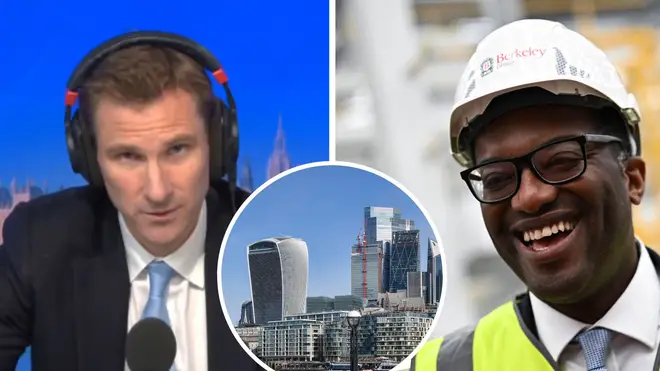
Vanessa Feltz 3pm - 6pm
24 September 2022, 10:21 | Updated: 24 September 2022, 11:10

Lower taxes for the wealthy will encourage investment in the UK, and the Government is not interested in the "politics of envy", a cabinet minister has told LBC.
Kwasi Kwarteng's mini-budget on Friday has been criticised as too generous to the rich and to businesses.
Among a massive set of tax cuts, designed to engineer economic growth, the new chancellor brought forward a 1p income tax cut, abolished the top rate and lifted the cap on bankers' bonuses.
They amounted to the biggest round of tax cuts since the 1970s.
LBC's Ben Kentish put to the chief secretary of the Treasury, Chris Philp, that the top earners would get a 5p tax cut per pound while the lowest earners get 1p.
Mr Philp hit back: "Don’t forget, first of all, people on higher incomes are paying proportionally far, far higher amounts of income tax to start with.
"The top 1% of earners are paying 28% of all income tax… the fiscal cost of removing that 45p tax band is only 1/20th of the total.
"But what we also want to do is keep taxes low in order to encourage investment and individuals and companies that are internationally mobile to come to the UK.

Ben Kentish quizzes Chief Secretary to the Treasury Chris Philp.
"And if you put taxes up too high those companies and those people choose to go somewhere else, or if they're here already they might choose to leave.
"We're not interested in the politics of envy, we're interested in cutting taxes for everyone, rich and poor, we're interested in encouraging people to be aspirational as much as they possibly can for themselves and for their families."
Read more: Kwarteng defends controversial tax cuts as some Tories 'deeply uncomfortable' about mini-budget
He added that "direct measures" have been taken by the Tories to help people on lower incomes, including by capping energy bills at £2,500 a year for two years, and that they would be helped by a growing economy triggered by tax cuts.
Mr Kwarteng went on the defensive after his mini-budget saw the pound slump and the director of the Institute for Fiscal Studies describe it as a "gamble".
The Government hopes the tax cuts will spurt growth.

Govt is 'throwing everything at helping people on lower incomes'
Measures announced on Friday include:
• Income tax: Basic rate will be cut by 1p to 19p and the 45p rate for top earners will be abolished from April 2023
• Stamp duty: The threshold for paying stamp duty was doubled to £250,000 - and for first time buyers it's been upped to £425,000
• Corporation tax: Planned rise from 19 to 25 per cent is scrapped
• National insurance: 1.25 per cent increase scrapped from November 6
• Bankers' bonuses: Cap axed
• Alcohol duty: Planned increase for beer, cider, wine and spirits all cancelled, coming into effect in February 2023
Read more: Kwasi takes axe to tax: Chancellor slashes £45billion off burden with biggest tax cuts since 1972
Mr Kwarteng said Friday's mini-budget was a "very good day for the UK".
"We're very, very upbeat about what we can do as a country. We were facing low growth and we want a high-growth economy and that's what this morning was all about."
He added: "It's absolutely fair to reduce people's taxes and to make sure, as you've admitted, that people are going to retain more of what they earn.
"The path we were on was simply unsustainable. We couldn't simply raise taxes indefinitely and hope that we would get prosperity."
Ms Truss tweeted: "Growth is key to delivering more jobs, higher pay and more money to fund public services, like schools and the NHS.
"Our Growth Plan sets out how we are going to rebuild our economy and deliver for the British people."
Lord Gavin Barwell told Tonight with Andrew Marr on LBC that some Tories were uncomfortable with it, while Labour's shadow chancellor Rachel Reeves called it "reckless".
The Institute for Fiscal Studies director Paul Johnson said: "Mr Kwarteng has shown himself willing to gamble with fiscal sustainability in order to push through these huge tax cuts.
"He is willing to shrug off the risks of inflation, and to invite significantly higher interest rates. Injecting demand into this high-inflation economy leaves the government pulling in the exact opposite direction to the Bank of England, who are likely to raise rates in response."